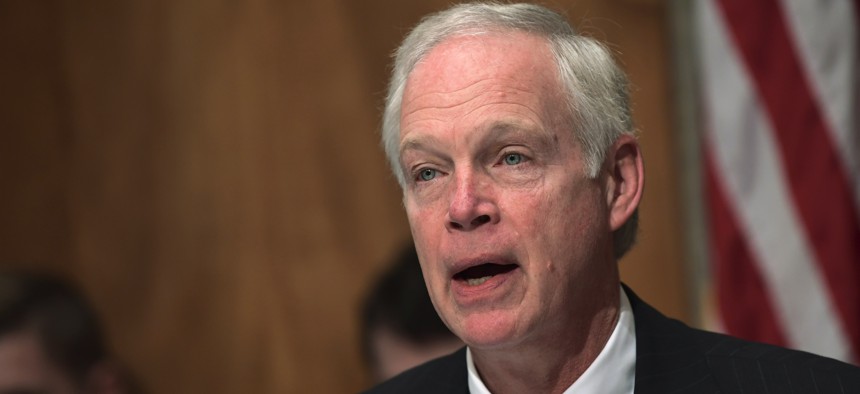Senate Homeland Security Chairman Questions State-Federal Balance in Disaster Response

Senate Governmental Affairs Committee Chairman Sen. Ron Johnson, R-Wis., speaks on Capitol Hill in Washington, Tuesday, Oct. 31, 2017, during a hearing on the federal response to the 2017 hurricane season. AP Photo/Susan Walsh

Connecting state and local government leaders
“In these situations, it really should be the state and local governments that take charge and FEMA is really a subordinate,” Wisconsin Republican Ron Johnson told Route Fifty.
WASHINGTON — State and local governments may be becoming too dependent on federal support after natural disasters, the chairman of a Senate committee that oversees homeland security suggested Tuesday at a hearing focused on the response to recent hurricanes.
“More and more often states are looking to the federal government to do what, I believe, is probably more suited toward state and local response. As a result, it puts a great deal of stress on federal disaster resources,” said U.S. Sen. Ron Johnson, a Wisconsin Republican.
“In these situations, it really should be the state and local governments that take charge and FEMA is really a subordinate,” Johnson told Route Fifty after the hearing, referring to the Federal Emergency Management Agency. “We’re kind of turning that structure on its head,” he added. “I would argue inappropriately.”
Brock Long, administrator of the Federal Emergency Management Agency, was among those who offered testimony to the Senate panel. He voiced support for shifting federal disaster recovery funds toward mitigation programs designed to prevent damage.
As it is now, Long noted, certain federal grant funds for mitigation projects are not available to a place until after it’s hit by a hurricane. “I believe that’s not the right way of doing business,” he said.
He highlighted mitigation funds provided under Section 404 of the Robert T. Stafford Disaster Relief and Emergency Assistance Act as money that might be shifted toward pre-disaster spending.
Long also said he’d like to develop “state integration teams,” with full-time FEMA staff embedded in state agencies, who can work on disaster planning with states on a regular basis. During his remarks, he characterized the optimal response and recovery process to disasters as “federally supported, state managed and locally executed.”
Major hurricanes during recent weeks have included Maria, which devastated Puerto Rico; Irma, which also struck Puerto Rico as well as the U.S. Virgin Islands and Florida; and Harvey, which brought catastrophic flooding to parts of southeast Texas, including Houston.
Meanwhile, wildfires in California during October killed 43 people, destroyed an estimated 8,900 structures and burned over 245,000 acres, according to the state's Cal Fire.
FEMA finance staff estimate the agency is probably spending roughly $200 million per day on efforts related to Maria, Irma and Harvey, and the California fires, Long said Tuesday.
In response to a question from Johnson about whether there was a trend toward states leaning more heavily on the federal government for disaster assistance, Long said the situation varies state-to-state, with some more capable of responding on their own than others.
Long suggested examining “rainy day fund” budget reserves and other mechanisms states have in place that could help with disaster response. “We do have to go back and re-establish with our state and local partners what is the baseline effort that should be there,” he said.
Johnson endorsed conducting an assessment along the lines of what the FEMA chief described.
The senator said it should look at both preparedness and vulnerabilities across states. And he said he would support the idea of moving funding currently in post-disaster accounts to pre-disaster mitigation programs only after such an assessment was completed.
Route Fifty asked Johnson what his response would be to state and local officials who say that their governments' finances are already under too much pressure to take on additional financial responsibilities during and after disasters.
“The federal government’s got a fair amount of financial problems as well,” he replied, noting the nation’s debt is now around $20 trillion.
Bill Lucia is a Senior Reporter for Government Executive’s Route Fifty and is based in Washington, D.C.

NEXT STORY: Corruption in the Cross Hairs as New Yorkers Go to Polls





